Admiral of the Fleet (Royal Navy): Difference between revisions
→Admirals of the Fleet: Added content Tags: Reverted Mobile edit Mobile web edit |
→Admirals of the Fleet: Grammatical error Tags: Reverted Mobile edit Mobile web edit |
||
| Line 302: | Line 302: | ||
| {{dts|10 July 1995}} || [[File:No image.svg|100px]] || <span style="display:none">Bathhurst Benjamin</span>[[Benjamin Bathurst (Royal Navy officer)|Sir Benjamin Bathurst]] || 1936 || Living || [[First Sea Lord]] 1993–1995 ||<ref>Heathcote, p. 23</ref> |
| {{dts|10 July 1995}} || [[File:No image.svg|100px]] || <span style="display:none">Bathhurst Benjamin</span>[[Benjamin Bathurst (Royal Navy officer)|Sir Benjamin Bathurst]] || 1936 || Living || [[First Sea Lord]] 1993–1995 ||<ref>Heathcote, p. 23</ref> |
||
|- |
|- |
||
| {{dts|16 June 2012}} || [[File:Carlos de Gales (2011).jpg|100px]] || <span style="display:none">Wales</span>[[Charles, Prince of Wales|The Prince of Wales]] || 1948 || Living || Honorary rank royal family (heir to the throne ||<ref>{{London Gazette|issue=60350|page=23557|date=7 December 2012 |nolink=y}}</ref> |
| {{dts|16 June 2012}} || [[File:Carlos de Gales (2011).jpg|100px]] || <span style="display:none">Wales</span>[[Charles, Prince of Wales|The Prince of Wales]] || 1948 || Living || Honorary rank, royal family (heir to the throne ||<ref>{{London Gazette|issue=60350|page=23557|date=7 December 2012 |nolink=y}}</ref> |
||
|- |
|- |
||
| {{dts|13 June 2014}} ||[[File:Lord Boyce.jpg|100px]] || <span style="display:none">Boyce Michael</span>[[Michael Boyce, Baron Boyce|The Lord Boyce]] || 1943 || Living || [[Chief of the Defence Staff (United Kingdom)|Chief of the Defence Staff]] 2001–2003. Honorary rank||<ref>{{cite web|url=https://www.gov.uk/government/news/2014-birthday-honours-for-service-personnel-and-defence-civilians|title=2014 Birthday Honours for service personnel and defence civilians|date=13 June 2014|publisher=Ministry of Defence|access-date=22 June 2014}}</ref> |
| {{dts|13 June 2014}} ||[[File:Lord Boyce.jpg|100px]] || <span style="display:none">Boyce Michael</span>[[Michael Boyce, Baron Boyce|The Lord Boyce]] || 1943 || Living || [[Chief of the Defence Staff (United Kingdom)|Chief of the Defence Staff]] 2001–2003. Honorary rank||<ref>{{cite web|url=https://www.gov.uk/government/news/2014-birthday-honours-for-service-personnel-and-defence-civilians|title=2014 Birthday Honours for service personnel and defence civilians|date=13 June 2014|publisher=Ministry of Defence|access-date=22 June 2014}}</ref> |
||
Revision as of 18:41, 1 February 2021
| Admiral of the Fleet | |
|---|---|
 The flag of an admiral of the Fleet is the Union Flag, and is in 1:2 rather than the 2:3 of other admirals' flags.[1] | |
 Insignia shoulder board and sleeve lace for Admiral of the Fleet | |
| Country | |
| Service branch | |
| Rank | Five-star |
| NATO rank code | OF-10 |
| Non-NATO rank | O-11 |
| Formation | 1688 |
| Next lower rank | Admiral |
| Equivalent ranks | |
Admiral of the Fleet is a five-star naval officer rank and the highest rank of the Royal Navy formally established in 1688.[2] The five-star NATO rank code is OF-10, equivalent to a field marshal in the British Army or a marshal of the Royal Air Force. Other than honorary appointments no new admirals of the fleet have been named since 1995.
History

The origins of the rank can be traced back to Sir John de Beauchamp, 1st Baron Beauchamp de Warwick, who was appointed 'Admiral of the King's Southern, Northern and Western Fleets' on 18 July 1360.[3] The appointment gave the command of the English navy to one person for the first time; this evolved into the post of Admiral of the Fleet.[4] In the days of sailing ships the admiral distinctions then used by the Royal Navy included distinctions related to the fleet being divided into three divisions – red, white, or blue. Each division was assigned at least one admiral, who in turn commanded a number of vice-admirals and rear admirals. While the full admirals were nominally equals, tradition gave precedence to the Admiral of the White who held the fleet rank in addition to his substantive role.[2]
Eighteenth and nineteenth centuries
The Restoration era brought a general reorganisation of naval ranks and structure, including formalisation of the admiral of the fleet role. In a break with tradition the rank was awarded to the most senior Admiral of the Red, who retained this substantive rank while also serving as Admiral of the Fleet. Appointments were for life, remunerated via a £5 daily stipend and an annual allowance of £1,014 for the hiring and maintenance of servants. It was intended that only one officer would hold the rank at any time, with their presence aboard any naval vessel to be denoted by the flying of the Royal Standard from the main mast.[5]
The ranks of Fleet Admiral and Admiral of the Red were formally separated from 1805, with an announcement in the London Gazette that "His Majesty [has] been pleased to order the Rank of Admirals of the Red to be restored"[6] in His Majesty's Navy..." as a separate role. The same Gazette promoted 22 men to that rank.[7] From the nineteenth century onward there were also occasional variations to the previous requirement that only one Admiral of Fleet could serve at one time. In 1821 George IV appointed Sir John Jervis as a second admiral of the fleet, to balance Lord Wellington's promotion as a second Field Marshal in the British Army. In 1830 King William IV increased the number of admirals of the fleet to three, though these additional lifetime postings subsequently lapsed. Between 1854 and 1857 there was no admiral of the fleet at all as the most senior naval officer of the time – Admiral of the Red Thomas Gosselin – was mentally ill and had not served at sea for forty-five years.[8][9] In deference to Gosselin's seniority the position was instead left vacant until his death in 1857, whereupon it was filled by admiral Charles Ogle.[5]
In practice the rank had lost its formal authority from 1828, when the professional head of the Royal Navy was given the title of First Naval Lord (renamed First Sea Lord in 1904). Thereafter it was periodically granted to retiring First Naval Lords as an honorary promotion, only passing to the most senior Admiral if there was no other candidate. On occasion even this seniority principle was abandoned, as on the death of Provo Wallis in 1892 when the promotion went to John Edmund Commerell rather than the senior Algernon Frederick Rous de Horsey.[10]
Twentieth century
The organisation of the British fleet into coloured squadrons was abandoned in 1864, though the rank of admiral of the fleet was maintained. During the two World Wars a number of serving officers held active commissions as admirals of the fleet, as well as the First Sea Lord. e.g. Sir John Tovey.[11]
Prince Philip, Duke of Edinburgh was created an Admiral of the Fleet in the Royal New Zealand Navy in 1954, following the coronation of his wife Elizabeth II as Queen. This promotion was to a New Zealand rank, separate from the Royal Navy rank.[12]
Following the creation of the Chief of the Defence Staff in 1959, the five naval officers appointed to that position became admirals of the fleet. Recognizing the reduced post–Cold War size of the British Armed Forces, no further appointments were made to the rank after 1995 when Sir Benjamin Bathurst was appointed admiral of the fleet on his retirement as First Sea Lord. The rank was not abolished and in 2012 the Prince of Wales became an honorary admiral of the fleet (as well as field marshal and marshal of the Royal Air Force), in recognition of his support to Queen Elizabeth II in her role of as Commander-in-Chief of the British Armed Forces. In 2014, Lord Boyce, a former First Sea Lord and Chief of the Defence Staff, was also appointed an honorary admiral of the fleet.[13]
Prince Charles, Prince of Wales, was presented with the honorary of Admiral of the Fleet of the Royal New Zealand Navy on 4 November 2015.[14]
Admirals of the Fleet
| Appointed |
Image |
Name |
Born |
Died |
Notes |
Reference |
|---|---|---|---|---|---|---|
| 1688 |  |
George Legge (later Earl of Dartmouth) |
1647 | 1691 | [15] | |
| 1690 | 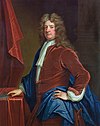 |
Edward Russell (later Earl of Orford) |
1652 | 1727 | [16] | |
| 1696 | 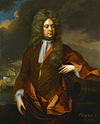 |
Sir George Rooke | 1650 | 1709 | circa | [17] |
| 13 January 1705 |  |
Sir Cloudesley Shovell | 1650 | 1707 | [18] | |
| 8 January 1708 |  |
Sir John Leake | 1656 | 1720 | [19] | |
| 21 December 1708 |  |
Sir Stafford Fairborne | 1666 | 1742 | circa | [20] |
| 12 November 1709 | 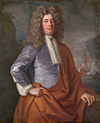 |
Sir Matthew Aylmer | 1650 | 1720 | [21] | |
| 14 March 1718 |  |
Sir George Byng (later Viscount Torrington) |
1663 | 1733 | [22] | |
| 20 February 1734 |  |
Sir John Norris | 1670 | 1749 | [23] | |
| 1 July 1749 |  |
Sir Chaloner Ogle | 1681 | 1750 | [24] | |
| 22 November 1751 |  |
James Steuart | 1690 | 1757 | [25] | |
| March 1757 |  |
George Clinton | 1686 | 1761 | [26] | |
| 30 July 1761 |  |
The Lord Anson | 1697 | 1762 | [27] | |
| 17 December 1762 | 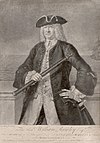 |
Sir William Rowley | 1690 | 1768 | circa | [28] |
| 15 January 1768 |  |
Sir Edward Hawke (later Lord Hawke) |
1705 | 1781 | [29] | |
| 24 October 1781 |  |
John Forbes | 1714 | 1796 | [30] | |
| 12 March 1796 |  |
The Earl Howe | 1726 | 1799 | [31] | |
| 16 September 1799 |  |
Sir Peter Parker | 1721 | 1811 | [32] | |
| 24 December 1811 |  |
The Duke of Clarence and St Andrews (later King William IV) |
1765 | 1837 | [33] | |
| 19 July 1821 |  |
The Earl of St Vincent | 1735 | 1823 | acting from May 1814 | [34] |
| 28 June 1830 |  |
William Williams-Freeman | 1742 | 1832 | [35] | |
| 22 July 1830 |  |
The Lord Gambier | 1756 | 1833 | [36] | |
| 22 July 1830 |  |
Sir Charles Pole | 1757 | 1830 | [36] | |
| 24 April 1833 |  |
Sir Charles Nugent | 1759 | 1844 | [37] | |
| 8 January 1844 |  |
Sir James Hawkins-Whitshed | 1762 | 1849 | [38] | |
| 9 November 1846 |  |
Sir George Martin | 1764 | 1847 | [39] | |
| 13 October 1849 |  |
Sir Thomas Byam Martin | 1773 | 1854 | [40] | |
| 1 July 1851 |  |
Sir George Cockburn | 1772 | 1853 | [41] | |
| 8 December 1857 |  |
Sir Charles Ogle | 1775 | 1858 | [42] | |
| 25 June 1858 |  |
Sir John West | 1774 | 1862 | [43] | |
| 20 May 1862 |  |
Sir William Gage | 1777 | 1864 | [44] | |
| 10 November 1862 |  |
Sir Graham Hamond | 1779 | 1862 | [45] | |
| 27 April 1863 |  |
Sir Francis Austen | 1774 | 1865 | [46] | |
| 27 April 1863 | 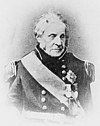 |
Sir William Parker | 1781 | 1866 | [47] | |
| 11 January 1864 |  |
Sir Lucius Curtis | 1786 | 1869 | [48] | |
| 12 September 1865 |  |
Sir Thomas Cochrane | 1789 | 1872 | [49] | |
| 30 November 1866 |  |
Sir George Seymour | 1787 | 1870 | [50] | |
| 30 January 1868 |  |
Sir James Gordon | 1782 | 1869 | on the Retired List | [51] |
| 15 January 1869 |  |
Sir William Bowles | 1780 | 1869 | [52] | |
| 2 July 1869 |  |
Sir George Sartorius | 1790 | 1885 | [53] | |
| 21 January 1870 |  |
Sir Fairfax Moresby | 1786 | 1877 | [54] | |
| 20 October 1872 |  |
Sir Houston Stewart | 1791 | 1875 | [55] | |
| 11 December 1875 |  |
Sir Provo Wallis | 1791 | 1892 | [56] | |
| 22 January 1877 |  |
Sir Henry Codrington | 1808 | 1877 | [57] | |
| 5 August 1877 |  |
Sir Henry Keppel | 1809 | 1904 | [58] | |
| 27 December 1877 |  |
The Earl of Lauderdale | 1803 | 1878 | [59] | |
| 27 December 1877 |  |
Sir Rodney Mundy | 1805 | 1884 | [59] | |
| 15 June 1879 |  |
Sir James Hope | 1808 | 1881 | [60] | |
| 15 June 1879 |  |
Sir Thomas Symonds | 1813 | 1894 | [60] | |
| 10 June 1881 |  |
Sir Alexander Milne, Bt. | 1806 | 1896 | on the Retired List | [61] |
| 1 December 1881 |  |
Sir Charles Elliot | 1818 | 1895 | [62] | |
| 29 April 1885 |  |
Sir Alfred Ryder | 1820 | 1888 | [63] | |
| 18 July 1887 |  |
The Prince of Wales (later King Edward VII) |
1841 | 1910 | honorary to non-Navy royalty | [64] |
| 1 May 1888 |  |
Sir Geoffrey Hornby | 1825 | 1895 | [65] | |
| 8 December 1888 | 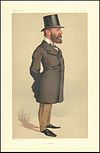 |
Lord John Hay | 1827 | 1916 | First Sea Lord 1886 | [66] |
| 2 August 1889 |  |
HIM German Emperor William II | 1859 | 1941 | honorary, to foreign royalty | [67] |
| 13 February 1892 |  |
Sir John Commerell | 1829 | 1901 | [68] | |
| 3 June 1893 | 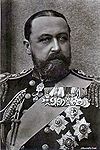 |
The Duke of Edinburgh (later Duke Alfred of Saxe-Coburg and Gotha) |
1844 | 1900 | [69] | |
| 20 February 1895 |  |
The Earl of Clanwilliam | 1832 | 1907 | [70] | |
| 23 August 1897 |  |
Sir Algernon Lyons | 1833 | 1908 | [71] | |
| 29 November 1898 |  |
Sir Frederick Richards | 1833 | 1912 | First Sea Lord 1893–1899 | [72] |
| 13 January 1899 |  |
Sir Nowell Salmon | 1835 | 1912 | [73] | |
| 3 October 1902 |  |
Sir James Erskine | 1838 | 1911 | [74] | |
| 30 August 1903 |  |
Sir Charles Hotham | 1843 | 1925 | [75] | |
| 16 June 1904 | 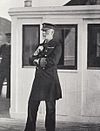 |
Lord Walter Kerr | 1839 | 1927 | First Sea Lord 1899–1904 | [76] |
| 20 February 1905 |  |
Sir Edward Seymour | 1840 | 1929 | [77] | |
| 5 December 1905 |  |
Sir John Fisher (later Lord Fisher) |
1841 | 1920 | First Sea Lord 1905–1910 and 1914–1915 | [78] |
| 1 March 1907 | 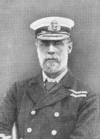 |
Sir Arthur Wilson | 1842 | 1921 | First Sea Lord 1910–1911 | [79] |
| 11 June 1908 |  |
HIM Tsar Nicholas II of Russia | 1868 | 1918 | honorary, to foreign royalty | [80] |
| 2 December 1908 |  |
Sir Gerard Noel | 1845 | 1918 | [81] | |
| 27 January 1910 |  |
Prince Henry of Prussia | 1862 | 1929 | honorary, to foreign royalty | [82] |
| 30 April 1910 |  |
Sir Arthur Fanshawe | 1847 | 1936 | [83] | |
| 6 May 1910 |  |
King George V | 1865 | 1936 | [84] | |
| 20 March 1913 |  |
Sir William May | 1849 | 1930 | [85] | |
| 5 March 1915 |  |
Sir Hedworth Meux | 1856 | 1929 | [86] | |
| 2 April 1917 |  |
Sir George Callaghan | 1852 | 1920 | [87] | |
| 3 April 1919 |  |
The Viscount Jellicoe (later Earl Jellicoe) |
1859 | 1935 | First Sea Lord 1916–1918 | [88] |
| 3 April 1919 |  |
Sir David Beatty (later Earl Beatty) |
1871 | 1936 | First Sea Lord 1919–1927 | [89] |
| 31 July 1919 |  |
Sir Henry Jackson | 1855 | 1929 | First Sea Lord 1915–1916 | [90] |
| 1 November 1919 |  |
Sir Rosslyn Wemyss (later Lord Wester Wemyss) |
1864 | 1933 | First Sea Lord 1918–1919 | [91] |
| 24 November 1920 |  |
Sir Cecil Burney, Bt. | 1858 | 1929 | [92] | |
| 5 July 1921 |  |
Sir Doveton Sturdee, Bt. | 1859 | 1925 | [93] | |
| 19 August 1921 |  |
The Marquess of Milford Haven | 1854 | 1921 | First Sea Lord 1912–1914. On the Retired List | [94] |
| 31 July 1924 | 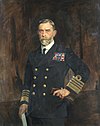 |
Sir Charles Madden, Bt. | 1862 | 1935 | First Sea Lord 1927–1930 | [95] |
| 8 May 1925 |  |
Sir Somerset Gough-Calthorpe | 1864 | 1937 | [96] | |
| 24 November 1925 |  |
Sir John de Robeck, Bt. | 1862 | 1928 | [97] | |
| 21 January 1928 |  |
Sir Henry Oliver | 1865 | 1965 | [98] | |
| 31 July 1929 |  |
Sir Osmond Brock | 1869 | 1947 | [99] | |
| 8 May 1930 |  |
Sir Roger Keyes, Bt. (later Lord Keyes) |
1872 | 1945 | [100] | |
| 21 January 1933 |  |
Sir Frederick Field | 1871 | 1945 | First Sea Lord 1930–1933 | [101] |
| 31 July 1934 |  |
Sir Reginald Tyrwhitt, Bt. | 1870 | 1951 | [102] | |
| 8 May 1935 | 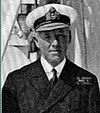 |
Sir Ernle Chatfield (later Lord Chatfield) |
1873 | 1967 | First Sea Lord 1933–1938 | [103] |
| 21 January 1936 |  |
King Edward VIII | 1894 | 1972 | [104] | |
| 12 July 1936 | Sir John Kelly | 1871 | 1936 | [105] | ||
| 11 December 1936 |  |
King George VI | 1895 | 1952 | [106] | |
| 21 January 1938 |  |
The Earl of Cork and Orrery | 1873 | 1967 | [107] | |
| 7 July 1939 | 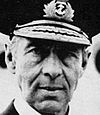 |
Sir Roger Backhouse | 1878 | 1939 | First Sea Lord 1938–1939 | [108] |
| 31 July 1939 | 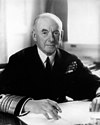 |
Sir Dudley Pound | 1877 | 1943 | First Sea Lord 1939–1943 | [109] |
| 8 May 1940 |  |
Sir Charles Forbes | 1880 | 1960 | [110] | |
| 21 January 1943 |  |
Sir Andrew Cunningham (later Viscount Cunningham of Hyndhope) |
1883 | 1963 | First Sea Lord 1943–1946 | [111] |
| 22 October 1943 |  |
Sir John Tovey (later Lord Tovey) |
1885 | 1971 | [112] | |
| 8 May 1945 |  |
Sir James Somerville | 1882 | 1949 | [113] | |
| 21 January 1948 |  |
Sir John Cunningham | 1885 | 1965 | First Sea Lord 1946–1948 | [114] |
| 22 October 1948 | 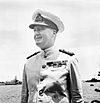 |
The Lord Fraser of North Cape | 1888 | 1981 | First Sea Lord 1948–1951 | [115] |
| 20 March 1949 | Sir Algernon Willis | 1889 | 1976 | [116] | ||
| 22 April 1952 | Sir Arthur Power | 1889 | 1960 | [117] | ||
| 1 June 1952 |  |
Sir Philip Vian | 1894 | 1968 | [118] | |
| 15 January 1953 | 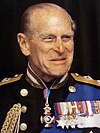 |
The Duke of Edinburgh | 1921 | Living | Lord High Admiral of the United Kingdom 2011–present | [119] |
| 1 May 1953 |  |
Sir Rhoderick McGrigor | 1893 | 1959 | First Sea Lord 1951–1955 | [120] |
| 22 April 1955 |  |
Sir George Creasy | 1895 | 1972 | [121] | |
| 22 October 1956 |  |
The Earl Mountbatten of Burma | 1900 | 1979 | First Sea Lord 1955–1959 Chief of the Defence Staff 1959–1965 | [122] |
| 10 May 1960 | Sir Charles Lambe | 1900 | 1960 | First Sea Lord 1959–1960 | [123] | |
| 23 May 1962 | Sir Caspar John | 1903 | 1984 | First Sea Lord 1960–1963 | [124] | |
| 12 August 1968 | Sir Varyl Begg | 1908 | 1995 | First Sea Lord 1966–1968 | [125] | |
| 30 June 1970 | Sir Michael Le Fanu | 1913 | 1970 | First Sea Lord 1968–1970 | [126] | |
| 12 March 1971 | Sir Peter Hill-Norton (later Lord Hill-Norton) |
1915 | 2004 | First Sea Lord 1970–1971 Chief of the Defence Staff 1971–73 | [127] | |
| 1 March 1974 | Sir Michael Pollock | 1916 | 2006 | First Sea Lord 1971–1974 | [128] | |
| 9 February 1977 | Sir Edward Ashmore | 1919 | 2016 | First Sea Lord 1977-1977 Chief of the Defence Staff 1977 | [129] | |
| 6 July 1979 | Sir Terence Lewin (later Lord Lewin) |
1920 | 1999 | First Sea Lord 1977–1979 Chief of the Defence Staff 1979–1982 | [130] | |
| 1 December 1982 | Sir Henry Leach | 1923 | 2011 | First Sea Lord 1979–1982 | [131] | |
| 2 August 1985 | Sir John Fieldhouse (later Lord Fieldhouse) |
1928 | 1992 | First Sea Lord 1982–1985 Chief of the Defence Staff 1985–1988 | [132] | |
| 12 April 1988 |  |
King Olav V of Norway | 1903 | 1991 | honorary, to foreign royalty | [133] |
| 25 May 1989 | Sir William Staveley | 1928 | 1997 | First Sea Lord 1985–1989 | [134] | |
| 2 March 1993 | Sir Julian Oswald | 1933 | 2011 | First Sea Lord 1989–1993 | [135] | |
| 10 July 1995 |  |
Sir Benjamin Bathurst | 1936 | Living | First Sea Lord 1993–1995 | [136] |
| 16 June 2012 |  |
The Prince of Wales | 1948 | Living | Honorary rank, royal family (heir to the throne | [137] |
| 13 June 2014 |  |
The Lord Boyce | 1943 | Living | Chief of the Defence Staff 2001–2003. Honorary rank | [138] |
See also
- British ensigns
- British and U.S. military ranks compared
- Coloured squadrons of the Royal Navy
- Comparative military ranks
- First Sea Lord
- Lord High Admiral of the United Kingdom
- Royal Navy officer rank insignia
- Admiral of the fleet as used in other countries
References
- ^ Prothero, David (3 December 2002). "United Kingdom: Royal Navy rank flags". Flags of the World. Archived from the original on 28 June 2006. Retrieved 28 July 2006.
- ^ a b "Information sheet no 055: Squadron Colours" (PDF). nmrn-portsmouth.org.uk. The National Museum Royal Navy. 2014. Retrieved 13 February 2019.
- ^ 1, St. George Tucker. Vol. (1996). Blackstone's commentaries: with notes of reference to the constitution and laws, of the federal government of the United States, and of the Commonwealth of Virginia; with an appendix to each volume, containing short tracts upon such subjects as appeared necessary to form a connected view of the laws of Virginia as a member of the federal union (Originally published: Philadelphia : William Young Birch, and Abraham Small, 1803. ed.). Union, NJ: Lawbook Exchange. p. xxxiii. ISBN 9781886363168.
{{cite book}}:|last1=has numeric name (help) - ^ "Trafalgar Ancestors, Glossary". nationalarchives.gov.uk. National Archives, 2017. Retrieved 24 July 2017.
- ^ a b Kemp, Peter, ed. (1993). The Oxford Companion to Ships and the Sea. Oxford: Oxford University Press. p. 6. ISBN 0192820842.
- ^ The Dictionary of National Biography (Volume 20, page 394) says of James Gambier, 1st Baron Gambier that he "seems to have been as ignorant of naval history as careless of naval prestige, and must be considered one of the chief of the perpetrators of the official blunder which, in the warrant of 9 Nov. 1805 appointing admirals of the red, spoke of the rank as restored to the navy, whereas, in point of fact, it had never previously existed."
- ^ "No. 15859". The London Gazette. 5 November 1805. p. 1373.
- ^ O'Byrne, William Richard (1849). . . John Murray – via Wikisource.
- ^ Stephen, Leslie; Lee, Sidney, eds. (1890). . Dictionary of National Biography. Vol. 22. London: Smith, Elder & Co.
- ^ Dreadnought Project overview
- ^ "No. 36255". The London Gazette. 19 November 1943. p. 5088.
- ^ Heald, Tim (1991). The Duke: A Portrait of Prince Philip. London: Hodder and Stoughton. pp. 264–267. ISBN 0-340-54607-7.
- ^ "2014 Birthday Honours for service personnel and defence civilians". Ministry of Defence. 13 June 2014. Retrieved 28 June 2014.
- ^ https://www.facebook.com/BritishMonarchistLeague/posts/974663839241309
- ^ "Naval Ranks NMRN Portsmouth". www.nmrn-portsmouth.org.uk. The National Museum Royal Navy, Portsmouth. 2019. Retrieved 8 February 2019.
- ^ "Russell, Edward, Earl of Orford". Oxford Dictionary of National Biography. Retrieved 16 May 2015.
- ^ "Rooke, Sir George". Oxford Dictionary of National Biography. Retrieved 16 May 2015.
- ^ "Shovell, Sir Cloudesley". Oxford Dictionary of National Biography. Retrieved 16 May 2015.
- ^ "Leake, Sir John". Oxford Dictionary of National Biography. Retrieved 16 May 2015.
- ^ "Fairborne, Stafford". Oxford Dictionary of National Biography. Retrieved 16 May 2015.
- ^ "Aylmer, Matthew". Oxford Dictionary of National Biography. Retrieved 16 May 2015.
- ^ "Byng, George, first Viscount Torrington". Oxford Dictionary of National Biography. Retrieved 16 May 2015.
- ^ Heathcote, p. 197
- ^ "No. 8864". The London Gazette. 4 July 1749. p. 6.
- ^ Heathcote p. 236
- ^ Heathcote, p. 45
- ^ "No. 10126". The London Gazette. 28 July 1761. p. 2.
- ^ "No. 10275". The London Gazette. 1 January 1763. p. 1.
- ^ Heathcote, p. 109
- ^ Heathcote, p. 87
- ^ "No. 13875". The London Gazette. 15 March 1796. p. 258.
- ^ Heathcote, p. 271
- ^ "No. 16554". The London Gazette. 21 December 1811. p. 2454.
- ^ "No. 17727". The London Gazette. 20 July 1821. p. 1511.
- ^ "No. 18701". The London Gazette. 2 July 1830. p. 1369.
- ^ a b "No. 18709". The London Gazette. 23 July 1830. p. 1539.
- ^ "No. 19042". The London Gazette. 26 April 1833. p. 793.
- ^ "No. 20305". The London Gazette. 16 January 1844. p. 146.
- ^ "No. 20660". The London Gazette (Supplement). 10 November 1846. p. 3994.
- ^ "No. 21037". The London Gazette. 13 November 1849. p. 3387.
- ^ "No. 21225". The London Gazette. 8 July 1851. p. 1769.
- ^ "No. 22071". The London Gazette. 11 December 1857. p. 4367.
- ^ "No. 22157". The London Gazette. 29 June 1858. p. 3090.
- ^ "No. 22627". The London Gazette. 20 May 1862. p. 2616.
- ^ "No. 22679". The London Gazette. 10 November 1862. p. 5343.
- ^ "No. 22730". The London Gazette. 28 April 1863. p. 2246.
- ^ "No. 22730". The London Gazette. 28 April 1863. p. 2246.
- ^ "No. 22806". The London Gazette. 12 January 1864. p. 157.
- ^ "No. 23014". The London Gazette. 15 September 1865. p. 4466.
- ^ "No. 23187". The London Gazette. 20 November 1866. p. 6158.
- ^ "No. 23349". The London Gazette. 4 February 1868. p. 537.
- ^ "No. 23462". The London Gazette. 26 January 1869. p. 407.
- ^ "No. 23516". The London Gazette. 13 July 1869. p. 3958.
- ^ "No. 23582". The London Gazette. 1 February 1870. p. 598.
- ^ "No. 23915". The London Gazette. 1 November 1872. p. 5106.
- ^ "No. 24278". The London Gazette. 24 December 1875. p. 6577.
- ^ "No. 24411". The London Gazette. 30 January 1877. p. 436.
- ^ "No. 24497". The London Gazette. 24 August 1877. p. 4957.
- ^ a b "No. 24537". The London Gazette. 1 January 1878. p. 2.
- ^ a b "No. 24734". The London Gazette. 17 June 1879. p. 3967.
- ^ "No. 24997". The London Gazette. 19 July 1881. p. 3548.
- ^ "No. 25044". The London Gazette. 2 December 1881. p. 6470.
- ^ "No. 25466". The London Gazette. 1 May 1885. p. 1984.
- ^ Heathcote, p. 68
- ^ "No. 25816". The London Gazette. 15 May 1888. p. 2766.
- ^ "No. 25883". The London Gazette. 14 December 1888. p. 7140.
- ^ Heathcote, p. 261
- ^ "No. 26262". The London Gazette. 26 February 1892. p. 1108.
- ^ Heathcote, p. 10
- ^ "No. 26601". The London Gazette. 22 February 1895. p. 1066.
- ^ "No. 26885". The London Gazette. 24 August 1897. p. 4726.
- ^ "No. 27029". The London Gazette. 2 December 1898. p. 7818.
- ^ "No. 27043". The London Gazette. 17 January 1899. p. 298.
- ^ "No. 27483". The London Gazette. 17 October 1902. p. 6569.
- ^ "No. 27593". The London Gazette. 1 September 1903. p. 5476.
- ^ "No. 27692". The London Gazette. 5 July 1904. p. 4259.
- ^ "No. 27766". The London Gazette. 21 February 1905. p. 1279.
- ^ "No. 27861". The London Gazette. 8 December 1905. p. 8812.
- ^ "No. 28001". The London Gazette. 5 March 1907. p. 1574.
- ^ Heathcote, p. 192
- ^ "No. 28201". The London Gazette. 1 December 1908. p. 9182.
- ^ Heathcote, p. 113
- ^ "No. 28362". The London Gazette. 3 May 1910. p. 3063.
- ^ Heathcote, p. 98
- ^ "No. 28703". The London Gazette. 21 March 1913. p. 2159.
- ^ "No. 29094". The London Gazette. 9 March 1915. p. 2365.
- ^ "No. 30008". The London Gazette. 3 April 1917. p. 3206.
- ^ "No. 31327". The London Gazette. 6 May 1919. p. 5653.
- ^ "No. 31327". The London Gazette. 6 May 1919. p. 5653.
- ^ "No. 31489". The London Gazette. 5 August 1919. p. 9961.
- ^ "No. 31715". The London Gazette (Supplement). 2 January 1920. p. 57.
- ^ "No. 32150". The London Gazette (Supplement). 3 December 1920. p. 11942.
- ^ "No. 32394". The London Gazette. 19 July 1921. p. 5733.
- ^ Order in Council of 19 August 1921; ADM 196/38
- ^ "No. 32962". The London Gazette. 5 August 1924. p. 5889.
- ^ "No. 33049". The London Gazette. 22 May 1925. p. 3445.
- ^ "No. 33110". The London Gazette. 1 December 1925. p. 7950.
- ^ "No. 33354". The London Gazette. 7 February 1928. p. 856.
- ^ "No. 33523". The London Gazette. 6 August 1929. p. 5145.
- ^ "No. 33604". The London Gazette. 9 May 1930. p. 2867.
- ^ "No. 33905". The London Gazette. 24 January 1933. p. 524.
- ^ "No. 34076". The London Gazette. 7 August 1934. p. 5054.
- ^ "No. 34159". The London Gazette. 10 May 1935. p. 3048.
- ^ Heathcote, p. 69
- ^ "No. 34308". The London Gazette (Supplement). 24 July 1936. p. 4742.
- ^ Heathcote, p. 99
- ^ "No. 34476". The London Gazette. 25 January 1938. p. 512.
- ^ Heathcote, p. 21
- ^ "No. 34651". The London Gazette. 4 August 1939. p. 5393.
- ^ "No. 34849". The London Gazette. 14 May 1940. p. 2892.
- ^ Heathcote, p. 60
- ^ "No. 36255". The London Gazette. 19 November 1943. p. 5088.
- ^ Heathcote, p. 233
- ^ "No. 38210". The London Gazette. 17 February 1948. p. 1128.
- ^ Heathcote, p. 90
- ^ "No. 38595". The London Gazette. 26 April 1949. p. 2052.
- ^ "No. 39571". The London Gazette. 13 June 1952. p. 3238.
- ^ "No. 39606". The London Gazette. 25 July 1952. p. 3999.
- ^ Heathcote, p. 210
- ^ Heathcote, p. 162
- ^ "No. 40487". The London Gazette. 24 May 1955. p. 3011.
- ^ "No. 40927". The London Gazette. 16 November 1956. p. 6492.
- ^ "No. 42058". The London Gazette (Supplement). 7 June 1960. p. 4037.
- ^ "No. 42704". The London Gazette. 15 June 1962. p. 4777.
- ^ Heathcote, p. 29
- ^ "No. 45138". The London Gazette (Supplement). 26 June 1970. p. 7183.
- ^ "No. 45331". The London Gazette (Supplement). 30 March 1971. p. 2937.
- ^ "No. 46225". The London Gazette (Supplement). 4 March 1974. p. 2887.
- ^ "No. 47160". The London Gazette (Supplement). 1 March 1977. p. 2825.
- ^ "No. 47904". The London Gazette (Supplement). 16 July 1979. p. 8998.
- ^ "No. 49174". The London Gazette (Supplement). 22 November 1982. p. 15293.
- ^ Heathcote, p. 78
- ^ "No. 51297". The London Gazette (3rd supplement). 12 April 1988. p. 4327.
- ^ Heathcote, p. 235
- ^ Oswald, Julian (1993). "Conventional Deterrence and Military Diplomacy". The RUSI Journal. 138 (2). RUSI: 29–30. doi:10.1080/03071849308445694.
- ^ Heathcote, p. 23
- ^ "No. 60350". The London Gazette. 7 December 2012. p. 23557.
- ^ "2014 Birthday Honours for service personnel and defence civilians". Ministry of Defence. 13 June 2014. Retrieved 22 June 2014.
Sources
- Heathcote, Tony (2002). The British Admirals of the Fleet 1734–1995. Pen & Sword Ltd. ISBN 0-85052-835-6.
External links
 Media related to Royal Navy admirals of the fleet at Wikimedia Commons
Media related to Royal Navy admirals of the fleet at Wikimedia Commons
